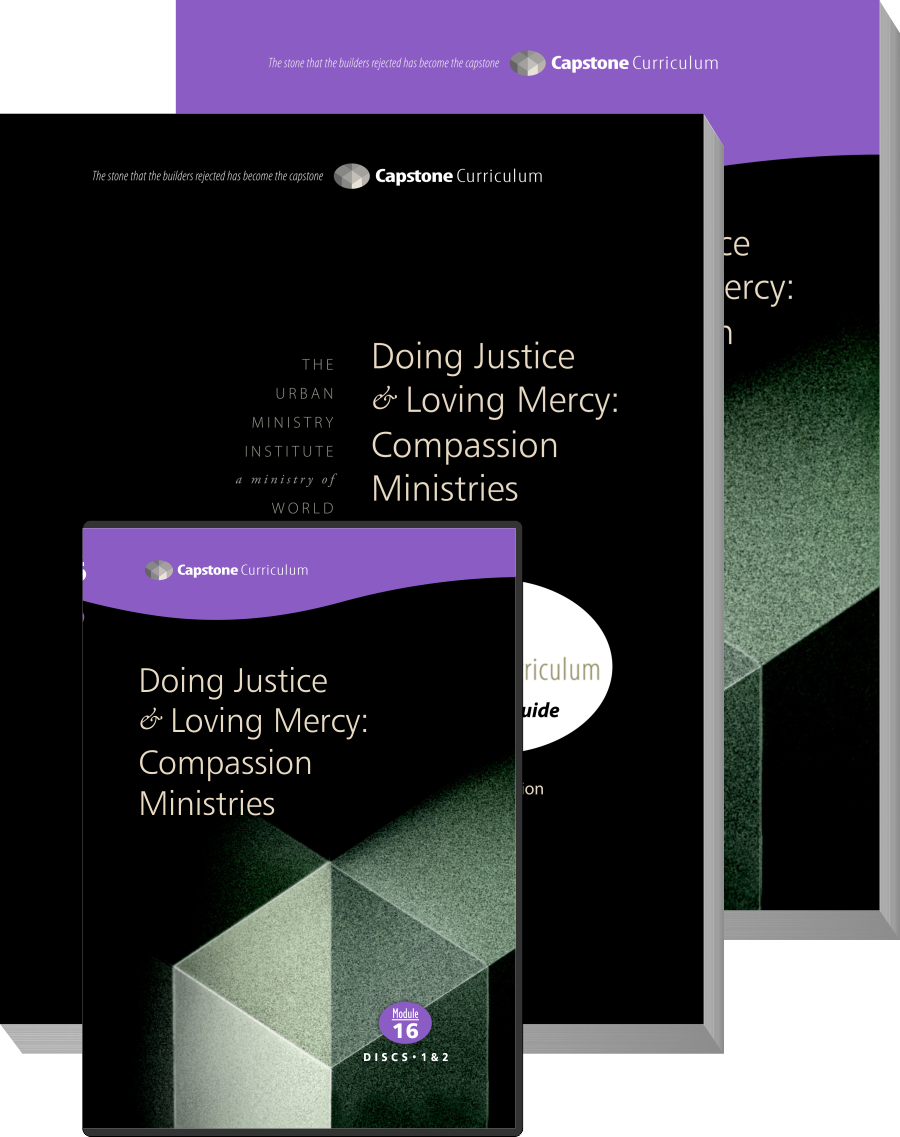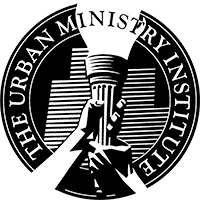 Module 16: Doing Justice & Loving Mercy
Module 16: Doing Justice & Loving Mercy
As disciples of Christ in the city, we are responsible to display the life of the Kingdom to Come in the midst of our churches, and through our lifestyles and ministries of compassion to others. This module, Doing Justice and Loving Mercy: Compassion Ministries, highlights the ways in which we both conceive and practice justice and righteousness in the body of Christ and in the world. As ambassadors of Christ, it is critical that we understand the richness of the biblical insights around this subject, as well as explore the possible ways in which we as believers and Christian ministers can demonstrate the love and justice of the Kingdom where we live.
We begin our study by defining the concept of the world from a biblical point of view, and assess the different ways in theological tradition that church/world relationships have been understood in the history of the Church. We see how the notion that all human beings are made in the image of God (imago Dei) can greatly empower us to take seriously our obligation to do justice and love mercy in our urban communities. We also consider the priority of demonstrating justice and mercy in the Church of Christ, and to those who are outside the faith. The Church serves both as the locus (place) of God’s working as well as his agent (ambassador) through whom he works. This course provides a simple yet effective approach Christians can use to organize as we seek the Lord’s will to minister mercy and justice in our urban neighborhoods. We illustrate this kingdom theology by calling city believers to live as world Christians, striving to think globally but to act locally. We briefly cover several contemporary issues of ethical significance for urban believers: the issues of poverty and oppression, the protection of the environment, the oft-misunderstood notion of diversity, and finally the themes of violence and war.
Course Details
Lesson 1: The Vision and Theology of the Kingdom
Lesson 2: The Urban Congregation
Lesson 3: Urban Community and Neighborhood
Lesson 4: Society and World
Module Descriptions
Doing Justice and Loving Mercy: Compassion Ministries
As disciples of the Lord Jesus Christ, we are responsible to display in our words and deeds the life of the Kingdom to Come in the midst of our churches, and through our lifestyles and ministries of compassion to others. This module, Doing Justice and Loving Mercy: Compassion Ministries, highlights the ways in which we as Christian leaders both conceive and practice generosity in the body of Christ and in the world. As leaders of the church in the city, it is critical that we understand the richness of the biblical insights around this subject, as well as explore the possible ways in which we as believers and Christian ministers can demonstrate the love and justice of the Kingdom where we live.
The first lesson, Let Justice Roll Down: The Vision and Theology of the Kingdom, focuses on the first word, or prolegomena toward an understanding of doing justice and loving mercy. We will define the structure of the world from a biblical point of view, and assess the different ways in tradition that church/world relationships have been viewed, and highlight a theology of God that can help us understand the critical role that doing justice and loving mercy plays in our kingdom testimony. We will also look carefully at the imago Dei (i.e., the image of God) in Scripture. We will see the uniqueness of humankind, and explore its implications for viewing all individuals, families, peoples, and nations as precious and irreplaceable.
Our second lesson, Doing Justice and Loving Mercy: The Urban Congregation, explores the priority of demonstrating justice and mercy in the Church of Christ. As the people of God, we must understand the “home grown” quality of Christian love, and in this lesson we will consider the significance of God’s grace in sustaining ministries of mercy and love, and the implications of experiencing God’s grace in our approaches to justice and mercy. We will observe, too, the practices of justice and mercy in God’s OT community as well as in the Church, God’s kingdom community today. We will also observe the “two-four-six” rules of God’s love and justice through the Church. We will begin by looking at the two objects which can receive God’s justice and mercy, members of the Church and those outside. We will then consider the four channels through which God manifests his love: the family, the Church, care societies, and the state. We will finish our study by looking at six principles which should inform our care-giving as local congregations.
In lesson three, Doing Justice and Loving Mercy: Urban Community and Neighborhood, we will discuss the two critical truths underlying our understanding of serving in the world: God as creator and Jesus as Lord of all. The Church responds to the lordship of Jesus Christ, serving both as the locus (place) of God’s working as well as his agent (ambassador) through whom he works. We will look at the four classic ways that church/world relations have been understood in Church history, and then look at four models which can help us understand better just how the urban church should interact with its neighborhood and community. We will here also introduce a simple yet effective approach to organize our efforts together as we seek the Lord’s will to minister mercy and justice in our urban neighborhoods. Prepare, Work, and Review, (PWR) is a simple but exciting process of seeking the Lord’s wisdom in ministry. And in this lesson we will provide some practical advice on how to organize in order to provide effective care to others as we address the needs of those in our community.
Finally, in lesson four, Doing Justice and Loving Mercy: Society and World, we will seek to expand this notion of doing justice and loving mercy to the very ends of the earth. Here we will look to comprehend our calling to live as world Christians, striving to think globally but to act locally. We will look critically at the issues of poverty and oppression, and the protection of the environment. After considering these weighty issues, we close this module’s discussion with a focus on one of the great issues of our time, the concept of difference. We will explore the oft-misunderstood notion of diversity from a kingdom perspective. We will explore the ways in which wrong concepts of difference can fuel bigotry and hatred among people, lead to violence, war and the loss of life and destruction of property. Here we will explore three Christian approaches to mass violence and war, and end our time with a plea for us to embrace a dynamic ministry of Christian peacemaking.
In a world torn by violence, cruelty, and injustice, we desperately need representatives of the Kingdom who can demonstrate both the justice and mercy of our Lord Jesus Christ. Only the Church can reveal the righteousness, unity, and grace of the Kingdom of God in the midst of a world torn by malice, vengeance, and disunity. Only in Christ can we pursue a peace that is authentic and that will last. Until our Lord returns, we are called to display his righteousness in the earth.
Reading Assignments
Lesson 1: Reading Assignments
By the conclusion of this lesson, you should have read the following:
Keller, Ministries of Mercy: The Call of the Jericho Road, pp. 9-92
Stott, Issues Facing Christians Today, pp. 9-94.
Lesson 2: Reading Assignments
By the conclusion of this lesson, you should have read the following:
Keller, Ministries of Mercy: The Call of the Jericho Road, pp. 93-173
Stott, Issues Facing Christians Today, pp. 97-321.
Lesson 3: Reading Assignments
By the conclusion of this lesson, you should have read the following:
Keller, Ministries of Mercy: The Call of the Jericho Road, pp. 174-233
Stott, Issues Facing Christians Today, pp. 325-499.
